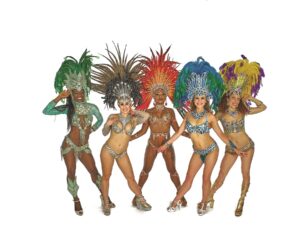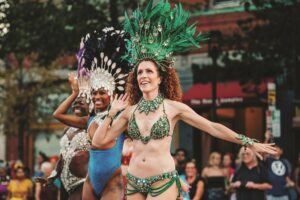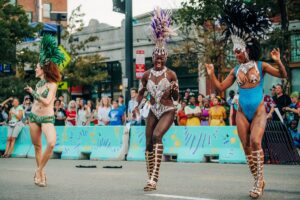Rachel Werkman, a founder of the Boston-based Brazilian dance group SambaViva, used to observe dance floors from the sidelines.

“I didn’t like to dance before I got into samba,” she confesses. “I was a little bit self-conscious.”
But there was something irresistible about the rhythms and the passionate interactions between samba dancers and musicians that enticed her, along with the inclusive culture she experienced in Brazil. Werkman is from Boston, but she says, “I feel as though maybe I was born in the wrong place.”
Because the Portuguese colonized Brazil in the 16th century, the two cultures are firmly linked. This summer, for the first time in its 76-year history, Provincetown’s Portuguese Festival will feature a Brazilian component of Portuguese culture with a Saturday night performance by SambaViva.
Werkman’s day job is at Harvard’s T.H. Chan School of Public Health, where she works as an associate director in executive and continuing professional education. Meanwhile, samba takes her almost every year to Brazil, where she has paraded in its Carnival half a dozen times.
After studying Spanish in high school and college, Werkman became fascinated by Latin cultures and languages. In 2001, she made her first visit to Brazil, where she found her background in Spanish a helpful springboard into Portuguese.
She was captivated by Brazil’s vibrant culture, and upon returning to the United States, she began taking dance classes with Deraldo Ferreira at the Brazilian Cultural Center of New England.
“I felt very welcomed,” Werkman says. “The intimidation factor was not present when I was learning.” Samba’s inherent openness drew her in, and she soon began dancing with Ferreira’s Samba Tremeterra company, continuing for 10 years until he returned to Brazil.

In 2011, longing for more samba, Werkman cofounded SambaViva with Randi (who does not use her surname), Roberta Korzeniowski, and Charlye Cunningham, who were also former members of the Samba Tremeterra company. The group is “dedicated to authentically promoting Brazilian culture through dance and music,” according to their website. Now, the “sky’s the limit” for SambaViva, says Werkman. She loves the creativity afforded through having what she calls “complete artistic and administrative control.”
Werkman was entranced not only by the physicality of samba but also by the history behind the steps. “I feel I need to understand where samba came from,” she says, “especially because it’s not my culture.”
Samba originated in communities of enslaved Africans who defied oppressive plantation rulers in Brazil by forming dance and music circles, gathering late into the night. “Samba is considered an act of resistance,” Werkman says. “It came from Africans who were brought to Brazil and were forbidden to practice their culture.”
Even the bossa nova musical style, associated with samba, has its roots in the Afro-Brazilian batucada drumbeat. Batucada is characterised by the energetic syncopated rhythms that form the foundational harmonic and melodic elements of bossa nova. Its lively, pulsating groove propels the music forward.

This drumbeat resonates with Werkman as a “universal sound that people can really connect with.”
Thought to be derived from the word semba in Angola’s Kimbundu language (the word means inviting people to dance through touching bellies), samba, at its etymological core, encourages active participation. This invitation to come together and express oneself is evident in today’s samba style, Werkman says: “The drummers and the dancers are constantly communicating.
“Even though samba has a history with an undercurrent of survival and resistance, I think there’s a lot of joy in it,” says Werkman.
Carol La Duke, the entertainment coordinator for Provincetown’s Portuguese Festival, has noticed an increased Brazilian presence on Cape Cod. According to 2021 data from the Migration Policy Institute, Massachusetts ranks second among all American states in Brazilian population, with Barnstable County alone boasting 4,900 Brazilians.
This year, in an effort to bridge a cultural gap in the Portuguese Festival, La Duke has set her sights on showcasing a greater cross-section of Portuguese and Brazilian culture. SambaViva’s energetic choreography will be featured on Saturday, June 24 at 9 p.m.on Ryder Street (Portugese Square) alongside the Berkshire Bateria Drummers and Samba Band.
“Art is art,” La Duke says. “I think they are going to be spectacular.”



